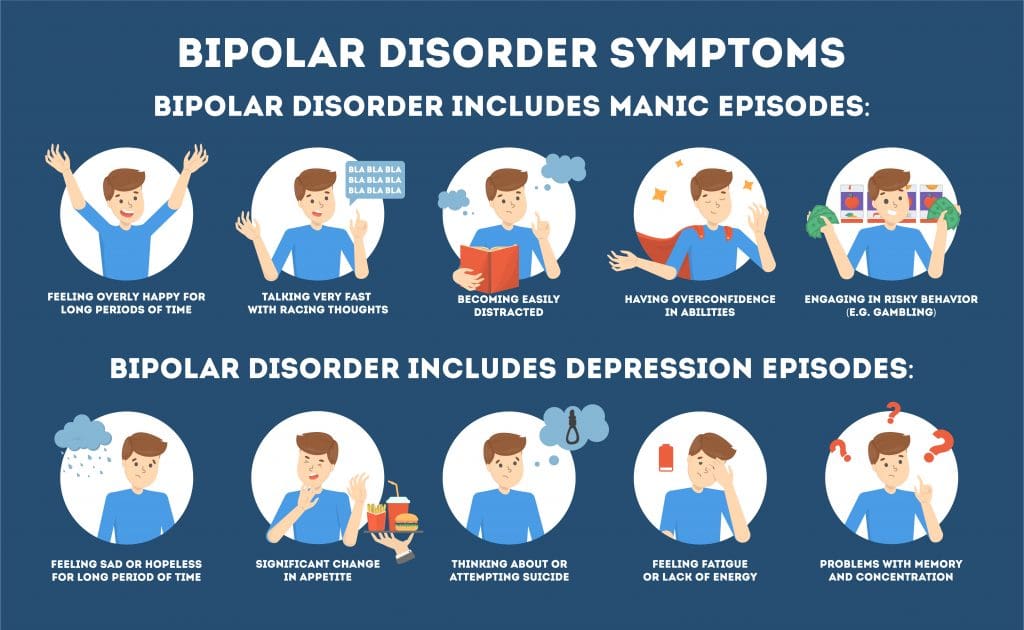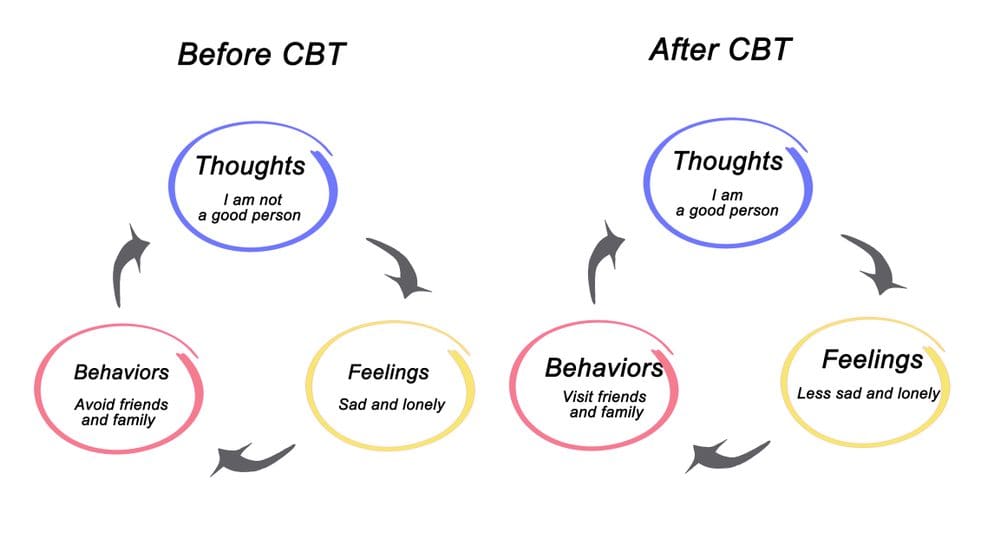A mood disorder is a mental health problem tied to serious changes in a person’s mood. Major depression and bipolar disorders are the two most common and serious types of mood disorders.
Other types of mood disorders include:
People with major depression are extremely sad and experience a very depressed mood. In contrast, people with bipolar disorder have “mood swings” over a period of days or weeks, ranging from depressive lows to manic highs. Typical symptoms of mood disorders include periods of depression, feeling sad, irritability, and restlessness. Mood swings, irregular sleep patterns, and a lack of interest in things you used to enjoy can all be symptoms of a mood disorder. In severe cases, suicidal thoughts, hallucinations, and delusions can also occur.
However, people with mood disorders experience different symptoms depending on their diagnosis. Symptoms of depression will be different than symptoms of bipolar disorder. For example, during the manic phase of bipolar disorder, over-excitement and risky behavior may occur. A depressive episode may cause you to feel intense sadness with little to no interest in doing anything.

A mental health professional, such as a psychiatrist or clinical psychologist, will give you your diagnosis. Psychiatrists are medical doctors with special training in psychological illnesses. Psychologists have PhD degrees and special training in the treatment of psychiatric disorders. Unlike psychiatrists, they cannot prescribe mood stabilizing medications.
The DSM-V diagnostic manual is the most important tool for the diagnosis of psychiatric disorders. The manual outlines the different types of mood disorders and how they are diagnosed.
For example, the guide defines the different forms of depression. These types of depression include major depression, persistent depressive disorder, postpartum depression, and more. There are also different forms of bipolar disorder, which is sometimes called manic depression. They include bipolar I and bipolar II disorder.
Factors such as family history, psychological history, life events, medical condition, illness course, and mood disorder symptoms will help your doctor to make the diagnosis. However, neuroimaging studies hold promise to improve diagnostic accuracy.
There are usually no clear-cut causes of a mood disorder. Genetic factors, life experiences, and hormonal factors may play a role. Brain injuries may also contribute to the onset of mood disorders, as can a medical condition. Substance abuse can contribute to a mood disorder, but in some cases, there seems to be no immediate cause at all.
Your treatment plan will vary depending on the kind of mood disorder you suffer from. Typically, treatment of mood disorders includes different kinds of talk therapy and mood stabilizing medications.
Talk therapy primarily revolves around cognitive behavioral therapy (CBT). The goal of CBT is to change your thinking patterns. CBT focuses on what a person is experiencing in the present rather than the past. Performing CBT in a group setting is also effective for the treatment of certain mood disorders.

Medication treatments often comprise of mood–stabilizing drugs. These include the major anti-depressive medication Zoloft and a host of others, including Selective Serotonin Reuptake Inhibitors (SSRIs). Lithium is also effective for the treatment of bipolar disorder. Newer antidepressants have increased the list of medications that are helpful for the treatment of major depression.
Mood disorders are the cause of much suffering. Loss of friends, loss of employment, and withdrawal from society are common when you suffer from a mood disorder. Additionally, suicide is a very real and severe complication of depression. However, there are excellent treatments now available to treat mood disorders. What’s more, exciting, new treatment options are on the horizon. If you or a loved one suffers from a mood disorder, seek the help of a psychological professional in order to find relief from your illness.
At Baton Rouge Behavioral Hospital, all of our treatment programs offer compassionate, comprehensive discharge planning. Whether you’re struggling with mental health problems or co-occurring addiction issues, we are here and ready to help. If you have questions about our treatment programs or discharge planning, fill out this contact form or call our admissions specialists at Baton Rouge Behavioral Hospital: (225) 567-8698.
